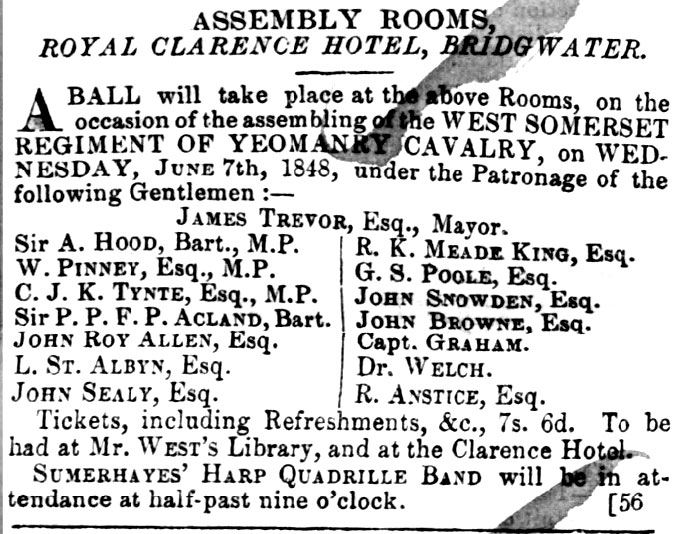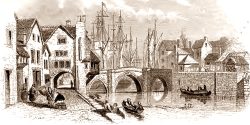This research page looks at some of the lost fairs & festivals of old Bridgwater. It is not an exhaustive list, with more to be added as they are discovered in the records.
Balls
“Dancing at the guildhall, forbidden by the corporation after a few years in 1731, was revived in 1755 in connexion with horse races [See below].” – Dunning – Victoria County History. A regular ball seems to have been held in 1812, as a Bridgwater Ball is mentioned on 23 September 1812 and again on 23 December 1812 [Taunton Courier, and Western Advertiser 10 September and 17 December 1812]. The Bridgwater Session Ball, presumably associated with the Quarter Sessions is mentioned in 1832, and 1834 [Taunton Courier, and Western Advertiser 18 June 1834]. Another Ball was associated with the West Somerset Yeomanry, mentioned in 1848:

The Bridgwater Races
From Pages 192-206 of Robert Dunning’s A History of the County of Somerset: Volume 6 (1992).
Horse racing was held in Bridgwater in the Summers from at least 1755 to the 1780s, and was accompanied by dancing in the Guildhall. They were probably held on St Matthew’s Field, hence the name of the Horse and Jockey Inn. The races were revived in 1813. By the 1830s they were held at a circular course, about a mile long, at Crook, to the north east of the town, being held in September. They were reived again in 1854 being held in late August, by 1867 they were held in late September. In 1898 the Bridgwater Steeplechase and hurdle races were held, but ceased by about 1905. Races were held 1926-9 in Durleigh.
The Eastover Revels
Powell’s Bridgwater in the Later Days (1908), pp.192-193 mentions:
Bridgwater also had other festivities and joys. Eastover, not to be outdone by the western side of the town, celebrated its revels, which long held sway with great success. Sports were arranged on the usual scale and in the manner common to West country towns, and the fun at these gatherings was fast and furious. The following note, published in a local newspaper on June 4th, 1832, might at first sight be a little misleading. It suggests a solemn municipal function:
“The Anniversary Dinner of the Mayor and Corporation of Eastover was held at the Globe Inn, on Tuesday last, Edward Bryant, jun. Esq, in the Chair. An excellent dinner and ample attendance was provided by Mr Thyer, whose endeavours to please were properly appreciated by a numerous and respectable party. It appeared to be equally the determination of the chairman and the company to avoid any topic that could by possibility break in upon the harmony which ought to prevail on such occasions. The party broke up at a late hour, highly pleased with the good feeling which had been displayed, and the good taste with which the duties of the Chair had been performed, under circumstances rendered unusually trying by passing events, and requiring no common degree of circumspection”
Eastover did not, as might be supposed from the above lines, possess a mayor and corporation, but it grew to be a sort of annual joke to seize upon some popular man, frequently the landlord of one of the inns, and elect him a sort of mock mayor for the occasion. A highly festive dinner was part of the programme, which was duly announced in the newspapers with all solemnity. On May 27th, 1833, the comong event was thus advertised:
“The annual dinner of the Mayor and Corporation of St. John’s Eastover, takes place on Wednesday next, at the Globe Tavern, when the Mayor elect will be installed with all the customary formalities. William Stradling, Esq., has been appointed to preside at the feast, and a numerous party is expected to honour the Mayor upon this occasion.”
… Mr Thyer, of the Globe Inn, proved to be a very popular Eastover mayor. It was the custom of the day to organise a great procession through the streets, through which the mayor of the day was carried seated aloft in a chair gaily decked with laurels. Various inn-keepers or other popular persons were chosen year after year. Mr York, landlord of the Ship Aground, took his turn in the high office; Mr Bullen, of the White Hart; Mr Jesty, of the Bunch of Grapes; and Mr Joseph Francis, the plumber. A greasy pole was erected near where Mr Waddon’s premises now stand, and the usual athletic contests, races, and so on were indulged in. The whole thing was got up to enliven the times and the people, and it was looked upon as an excellent joke.
The Pig Cross Revels
Ibid, pp.194-5
On May the 29th, Oak Apple Day, the Pig Cross Revels, for the western part of Bridgwater, took place. Oak boughs were exhibited in front of all the inns, not so much, probably, from any intense feeling of affection towards the Stuarts as from a conviction that it was the proper thing to do, and that the custom in some remote way implied a knowledge of English history and a spirit of loyalty. Between the cattle market and the Mason’s Arms (in those days the inn was known as the Fighting Cocks) a greased high pole was erected, at the top of which a leg of mutton was placed, or possibly a box-hat. A man named Dando (he only died a few years ago) was a great hero in those days, and frequently won the leg of mutton or the hat. It was alleged, how- ever, that he used snorters, which was presumably an irregular deed, calculated to give him an undue advantage over other competitors. A snorter was a hollow ring, grooved and provided with teeth like a saw, wherewith to bite the wood of the slippery pole. By fixing these to the hands and feet it was far easier to climb up. A wagon was also placed by the old Pig Cross (in front of the Blake Arms, once the Duke of Wellington), with a pole put up at each end, connected by a slack horizontal rope. From this rope penny rolls were suspended, which had been dipped in treacle. The boys who were competitors in the elegant contest had their hands tied behind them, and were ranged in a row of, say, half a dozen in front of the roll- laden rope. In the competition the boy was the winner who first finished eating his roll, a difficult and sticky task. There was also jumping in sacks and athletic competitions of many kinds. A favourite event was the race provided for boys and girls, who started from the Tynte Arms up to the eastern end of St. Matthew’s fields (at the top of West Street), and back again. Such were the Pig Cross revels of former days.
The Bridgwater Regatta
There are mentions of a ‘Bridgwater Regatta’ in 1835, but these more properly relate to the Burnham Regatta around the Gore Sands. 1855
Bridgwater Mercury 09 July 1857
Prizes were offtered for a rowing match for four-oared ship’s boats, a sculling match, a match for fishing boats, and four oared gigs. Also a sculling match for boys. Boats were to go up the west side of the river, pass round a moored boat and proceed home by the east side.
Bridgwater Mercury 24 May 1860
The fifth annual Regatta held on the previous Monday evening. The starting point was the southern side of the bridge for about a mile upstream. Mention of a fatality among the onlookers in previous years, from boys standing in moored boats at the side of the river. A pilot was on hand to swim to the recuse of anyone drowning. First race for ships boats not exceeding 15 feet, rowed by one man with a pair of oars. Second race for gig boats. Third race for gig boats. Fourth race for four-manned ships’ boats. Fifth race for fishing boats belonging to pilots and fishermen residing within three miles of the town, one man with a pair of oars. 11 of the victorious boats were built by Mr. Gough of Bridgwater.
Bridgwater Mercury 10 September 1873
Describes a lapse of about ten years since the last Regatta [although one appears to have been held in 1868]. There was regret that it was held so late in the year that there was restricted daylight. The first race was between four four-oared boats with professional teams going three quarters of a mile – to just beyond the gas works at a place called ‘Stump’s Bathing Place’ and back – first with the current, then against it. The second match was similar, but with amateur teams. The third match was for ships’ boats not exceeding sixteen feet in length.
Taunton Courier, and Western Advertiser 19 August 1885
Five events held, the usual course being upstream and back.
Western Daily Press 12 August 1927
After a period of about 40 years. Bridgwater regatta on the River Parrett was revived last evening and attracted an enormous crowd estimated at 10.000. Mr A. C. Cross was the chief organiser and members of the Bridgwater Swimming Club assisted in the arrangements.
Results:- Swimming Marathon, from Chilton Brickyard to Blake Gardens.-I. P. Slade; 2, R. Andrews -.3. A Hobbs.
Flatners’ boat race (to “Stumps” and back)–1. Reasons and Thorne; 2. E. Pocock and R. Pocock; 3. W. Pocock and Turner.
Swimming race across river and back (confined to members of the R.A.F.) -1. (Corpl Nash; 2. A.C. Flagg; .3, L.A.C.. Allsop.
Ditto (open)-1. W. Sparkes; 2. J. Fisher; 3. E. Godfrey
Ditto (confined to members or C Co. 5th Somerset Light Infantry) 1. Maxwell: 2. Bond; 3. Hill
Team Race- Bridgwater beat Bridport.
Water Polo match –Briddport beat Bridgwater 8-3.
Walking the greasy pole – 1. W. Harris 2. E. Godfrey.
An exhibition of swimming and diving was given by Miss Snelgrove and Mrs Huntley (Weston-super-Mare).
Misc Sports
The Taunton Courier of 4 March 1819 describes the old Valiant Soldier in Penel Orlieu and the ‘Old Fives Place’ a large enclosed yard with stabling for 100 horses. Fives was a very popular West Country sport.
